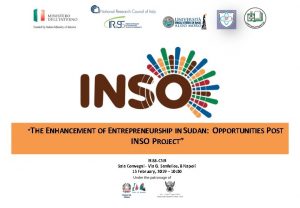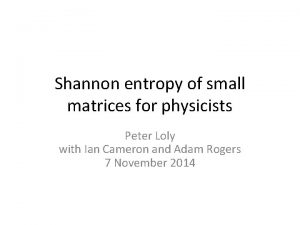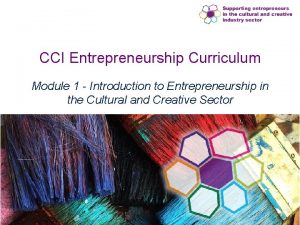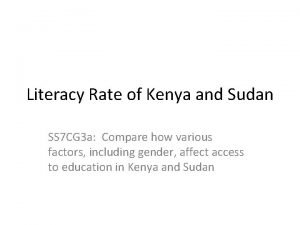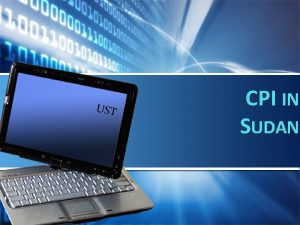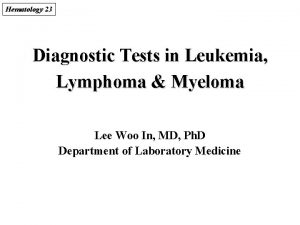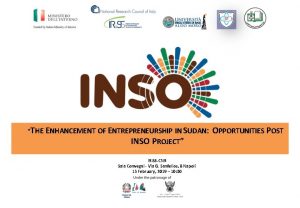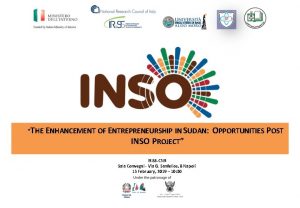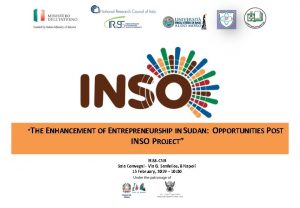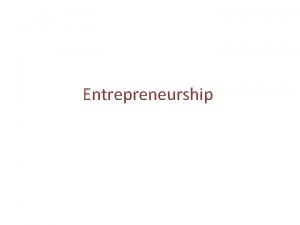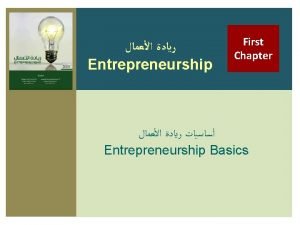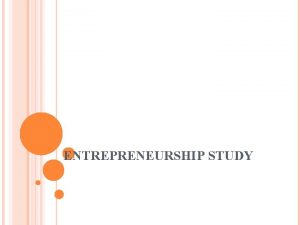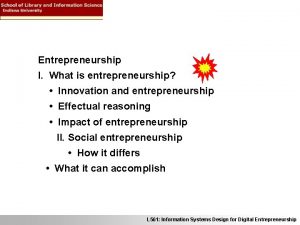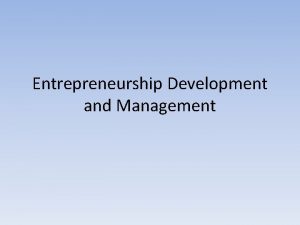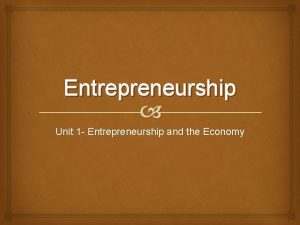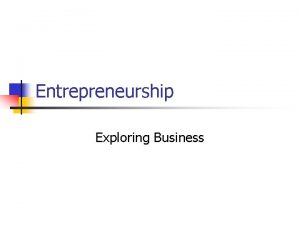THE ENHANCEMENT OF ENTREPRENEURSHIP IN SUDAN INSO PROJECT
















- Slides: 16

“THE ENHANCEMENT OF ENTREPRENEURSHIP IN SUDAN: INSO PROJECT” IRISS-CNR Sala Convegni - Via G. Sanfelice, 8 Napoli 15 February, 2019 – 10: 30 OPPORTUNITIES POST

THE STRATEGIC ROLE OF CCST IN THE IMPLEMENTATION OF THE INSO INCUBATOR Jorge NARANJO ALCAIDE Comboni College of Science and Technology

INTRODUCTION • How the INSO Project led Comboni College of Science and Technology (CCST) to the preparation of a Start-ups Incubator. • Meeting after last Congress on 22 nd November 2017 among MOHE and CCST teams, Prof. Alfonso Morvillo and Dr. Chiara Impagliazzo, to discuss about the best way to give continuity to the Project.

1. WHY AN INCUBATOR The reasons to think of the Incubator as logical consequence of INSO project can be drawn from the analysis of the following elements: • the structure of the Sudanese labour market; • the curricula of university studies in Sudan; • the challenges that start-ups usually face; • the feedback of the trainers who worked with the students of the project.

1. 1 The analysis of the structure of the Sudanese labour market Fundamental elements: • the dominance of public sector in total employment; • the demographic structure with a very rapid growth and very high percentage of young population; • the low skill level and brain drain problems; • the increasing rate of unemployment; • and the mismatch between the educational offer and the labour market.

1. 2 UNIVERSITY STUDIES CURRICULA AND TRAINERS FEEDBACK • “Generally, entrepreneurship is not encouraged as a professional career and this is reflected in the lack of a national plan for developing entrepreneurship and by the small number of technical secondary schools (98) versus academic secondary schools (3. 128)” (Darbo& Eltahir, 2017, p. 292). • “The teaching of entrepreneurship education is not yet sufficiently incorporated into higher education institutions’ curricula in Sudan” (Timan & Gangi, 2015, p. 244). • Meridies Program: Innovation, Business Planning, Leadership, Entrepreneurship and Sustainability. • New BSc in IT

1. 3 START-UPS CHALLENGES • Lack of know-how of university students in relation to the transformation of their business ideas into effective companies. “Start-ups frequently show lack of management knowledge and management skills (particularly in the case of technology- oriented ventures)” (Allen and Rahman 1985; Smilor 1987; quoted by Roseira, Ramos, & Maia, 2014, p. 4). • Lack of visibility in the market. • Lack of connections.

2. ANALYSIS OF THE ENVIRONMENT 2. 1 PUBLIC INITIATIVES IN SUDAN: SUST + SAMIQAT, “Technological Park” at the Merowe-Abdulatif Al-Hamad University of Technology; Information Security and Software Engineering Incubator Project at MOHE; Entrepreneurship Center of the School of Administrative Sciences of the University of Khartoum. 2. 2. PRIVATE INITIATIVES IN SUDAN • Impact Hub Khartoum: they work on providing co-working spaces as well as incubator & accelerator programs for entrepreneurs (March 2017). • 249 Start Up is a Sudanese enterprise that also provides co-working spaces in Khartoum with shared desks, private offices, all with high-speed internet access. They have international and local mentors in a curriculum designed to promote growth for the entrepreneurs and startups. They are running an Acceleration Programme in collaboration with Haggar Company and they inaugurated an Incubation Program in collaboration with the Embassy of the Netherlands on 18 th November 2018 (Orange Corner). This program offers funds to 20 selected young entrepreneurs.

2. 2 PRIVATE INITIATIVES IN SUDAN

2. 3 UNIVERSITY INCUBATORS

2. 4 INSO INCUBATOR SWOT ANALYSIS Strengths Weaknesses The incubator is associated to CCST which is ready Small number of graduation projects per-year. to share resources like staff specialized in Small numbers of hosted projects. Computer Science and Business Administration; infrastructure (library, meetings room, Conference Hall. . . etc); contacts and national and international partners (MOHE, IRISS, UPV, …). It is planned to be self-sustainable without dependence from foreign financial support. Affordable price Opportunities Threats Small number of technological incubators in Risk of potential failure of projects after incubation Khartoum. period is over. Unclear taxing and banking system which may lead to false numbers on profit share. Low numbers of eligibility projects.

3. STRATEGIC PLANNING Mission • CEIC is an incubator associated to CCST that supports the creation of microcompanies by young entrepreneurs with the goal of fostering sustainable and community development. Vision • CEIC intends to promote peace building and social inclusion through community development of university students and graduates particularly from peripheral and marginalized areas. Values and purpose • Social cohesion and integration through human capital enhancement. • Diminish unemployment and generate local sustainable development. • To propose a concept of entrepreneurship that considers the social and environmental impact of the entrepreneurial activity and is inspired by Circular Economy models. • Add a value proposition to the CCST

4. SERVICE DESCRIPTION Pre-incubation Incubation Acceleration Basic training and overview to wake up the hidden entrepreneurs. (Short Term) Hardworking training Networking investors’ and accompaniment platform to to enhance the skills consolidate business of future leaders. operations and reduce (Middle term) timeframe. (Long Term) From April 2019 From 2020

CRITERIA FOR THE SELECTION OF PROJECTS Priority will be given to projects that: Have technological basis; Are innovative and have potential for growth; Have capacity to create jobs; Solve a real problem; Meet a market need; Are managed by the community; Have potential to strengthen and diversify the economy; Generate social and economic benefits for the community at a short and long term; • Are compatible with the Circular Economy framework; • Are located in marginalized areas. • •

5. ORGANIZATIONAL STRUCTURE AND JURIDICAL STATUS • The National Council of Higher Education and Scientific Research has just approved on 5/2/2019 a Bylaw to Regulate the Work of Incubators in Institutions of Higher Education and Scientific Research. • The Bylaw defines a quite flexible legal work that encourages creativity, research and innovation. CEIC Incubator shares this ends but has also a strong social character. Social and environmental impact, community development, entrepreneurship and circular economy are also fundamental concepts that will shape the activity of the Incubator. • Board of Directors + Technical Advisory Committee (IRISS? ) + Director + Deputy Director + Some assisting staff. • To start: Two full time positions that will work as a team and share responsibilities.

6. PROJECT SUSTAINABILITY • Commission Model: the incubator will sign a contract with the incubatees by asking them a commission of the future revenues of their businesses. • INCUBATOR ACTIVITIES: Workshops, conferences and competitions can be organised in order to complement the formation to the entrepreneurs. • LOCAL SPONSORS: JTI • HAGGAR HOLDING
 Inso south sudan
Inso south sudan Insõ
Insõ Introduction to entrepreneurship module
Introduction to entrepreneurship module C skolyoz egzersizleri ftr
C skolyoz egzersizleri ftr Sudan black b 염색
Sudan black b 염색 Bec curriculum in the philippines
Bec curriculum in the philippines Sudan literacy rate
Sudan literacy rate Karanlık gecede kara sudan zap suyuna giden yol
Karanlık gecede kara sudan zap suyuna giden yol Sudanese electricity distribution company
Sudanese electricity distribution company Sidrotic granules
Sidrotic granules Jugosławia na co się rozpadła
Jugosławia na co się rozpadła Cpi
Cpi Ultramicrotomo
Ultramicrotomo Sudan black
Sudan black Ambulasyon egzersizleri
Ambulasyon egzersizleri Sudan iii indicator biomolecules
Sudan iii indicator biomolecules National audit chamber sudan
National audit chamber sudan
